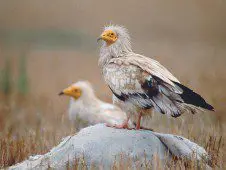Most birds are located in the Northern Hemisphere
According to a new estimate, there are at least 50 billion individual wild birds in the world. House sparrows alone make up about 1.6 billion of them. However, most bird species are rare. This type of screening of the global bird population will help in efforts to protect birds from extinction, says a team from the University of New South Wales in Sydney, Australia.
“We spend a lot of time and money counting our own species, but we really need to think about how we count the biodiversity we share the planet with,” researcher Dr Corey Callaghan told the BBC.
Counting the number of birds in the world is a complex task, without definite answers, they explain. In past rough estimates, there are 200 to 400 billion birds, classified as 10 to 13,000 bird species.
Australian researchers analyzed 9,700 species of live birds (excluding all poultry) using data from the last decade recorded by observers in an online database. They refined the data using modeling and information from on-site experts to form a more accurate evaluation.
The study, published in the Proceedings of the National Academy of Sciences [PNAS May 25, 2021 118 (21) e2023170118; https://doi.org/10.1073/pnas.2023170118 Edited by Simon Asher Levin, Princeton University, Princeton, NJ, and approved March 28, 2021 (received for review November 16, 2020)], suggests that most birds are found in the Northern Hemisphere: in Europe, North Asia, North Africa, parts of the Arabian Peninsula and North America. In contrast, very few birds are found in Madagascar and Antarctica.
The research provides data for nearly all the world’s bird species
Data Availability: eBird data are freely available to download from https://ebird.org/data/download. Population estimates were extracted from refs. 62 T. Will et al., Handbook To the Partners in Flight Population Estimates Database, Version 3.0 (PIF Technical Series, 2019) and 63 A. Musgrove et al., Population estimates of birds in Great Britain and the United Kingdom. Br. Birds 106, 64–100 (2013) and https://datazone.birdlife.org/home. Range maps used to adjust population areas are available from BirdLife International. All trait data are freely available through the sources mentioned above. Code and necessary data to reproduce our analyses are available from Zenodo, https://doi.org/10.5281/zenodo.4723365 (C. T. Callaghan, S. Nakagawa, W. K. Cornwell, Data and code for Callaghan et al. 2021. Global abundance estimates for 9,700 bird species. PNAS. Deposited 27 April 2021).
According to Journal Citation Reports, the journal has a 2019 impact factor of 9.412. PNAS is the second most cited scientific journal, with more than 1.9 million cumulative citations from 2008 to 2018. In the mass media, PNAS has been described variously as “prestigious”, “sedate”, “renowned”, and “high impact”. Nature, Science, and PNAS are the three most prestigious general-science journals, and Nature and Science are among the most influential journals overall, based on the journal Impact Factor (IF).







